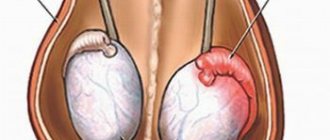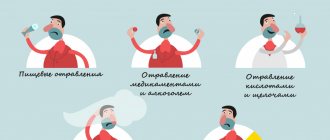Causes of chronic cystitis
Effective treatment of chronic cystitis in women is possible only with accurate identification of the cause. The chronic form is a consequence of incorrect treatment of the acute phase. Most often, pathology is provoked by infectious agents. The high risk of infection is explained by the proximity of the urinary tract to the anus. Also, the danger increases due to unprotected sex with casual partners, when the causative agent is sexually transmitted infections.
In addition, risk factors for the inflammatory process are:
- hormonal changes in the body;
- use of medications;
- allergic reactions;
- viral infection;
- hypothermia;
- decreased immunity;
- abnormalities in the structure and functioning of the urinary tract;
- lack of personal hygiene;
- failure in the endocrine system;
- chronic systemic diseases (diabetes, oncology, gastrointestinal dysfunction).
Where to go
Urological Center of Branch No. 1 of the Federal State Institution “GVKG named after. Academician N. N. Burdenko" treats various diseases of the genitourinary system, including cystitis of all forms, including chronic. The main advantages of our hospital are:
- solid experience in the treatment of urological pathologies accumulated by our department since 1974;
- highly qualified employees – holders of medical degrees, doctors of the highest category;
- technical base that fully meets modern criteria.
Pathogenesis
Treatment of chronic cystitis is aimed at improving the general condition and relieving symptoms. The pathology manifests itself as pain and frequent urge to urinate. If the inflammatory focus is not stopped, the signs of the disease increase. Patients note:
- burning and discomfort in the perineum;
- pain when urinating;
- feeling of incomplete emptying of the bladder;
- change in the color and odor of urine;
- the appearance of blood in the urine;
- pain in the lower abdomen radiating to the lower back.
Pathology can develop and lead to general malaise, fever, loss of strength, and headache.
Cystitis in children
Cystitis in children is an infection well known to pediatricians, accompanied by painful and frequent urination, with a possible increase in body temperature and fever. Cystitis occurs in children of any age and both sexes, but in girls due to anatomical features it is more common. Cystitis caused by chlamydia occurs in children (a child becomes infected due to the presence of chlamydia in his parents or when the child violates hygiene standards and frequently visits swimming pools and saunas). Also, cystitis in children can appear with weakened immunity.
The pain and burning sensation that a child experiences when urinating can trigger acute urinary retention.
Diagnosis of chronic cystitis
The doctor determines how to treat chronic cystitis in a woman, based on data from laboratory and instrumental studies. To make a decision, the specialist collects anamnesis, assesses the time of development of symptoms, and takes into account concomitant chronic diseases. The diagnosis is made based on the following studies:
- general blood analysis;
- general urine analysis;
- vaginal smear for microflora;
- Blood PCR for sexually transmitted infections;
- bacterial culture of urine;
- endoscopic examination of the bladder;
- Ultrasound of the genitourinary system.
Cystitis in men
1 Diagnosis of cystitis in men
2 Diagnosis of cystitis in men
3 Diagnosis of cystitis in men
Cystitis in men is a rather rare phenomenon; the disease can appear as a result of an inflammatory infection, due to which the urethra, ovaries and prostate gland begin to suffer.
To make a correct diagnosis, sometimes men only need to undergo a rectal examination, which will help determine whether there is an enlarged prostate. If the inflammation continues long enough, you will need to do an ultrasound and intravenous urography.
Therapy
The treatment regimen for chronic cystitis will vary depending on the pathogen. In addition to taking medications, it is important to maintain a healthy lifestyle and diet. For a speedy recovery, rest and light food are desirable. The drinking regime is plentiful; the use of diuretics is recommended to remove pathogenic microorganisms.
Prescriptions may consist of the following medications:
- antibacterial (when pathogens are detected on crops);
- antispasmodic (eliminate muscle spasms, relieve pain, promote urine evacuation);
- anti-inflammatory (improves the condition of the mucous membrane, promotes epithelial regeneration).
Herbal medicine is effective as part of complex treatment. It is important to understand that the course prescribed by the doctor must be completed in full. Taking medications should not be stopped after the first improvement, because the disappearance of symptoms does not indicate complete recovery.
After a course of antibiotics, if necessary, the doctor may prescribe restorative therapy, which will be aimed at normalizing the microflora of the vagina and gastrointestinal tract.
What to do when treating an illness
During treatment of chronic cystitis, the patient is advised to follow certain rules.
- Bed rest. When the disease worsens, you should stay in bed as much as possible. If the body temperature is elevated, the patient is prescribed an antipyretic drug. It is necessary to drink enough liquid per day to quickly wash out the infection. In addition, the patient is prescribed a special diet, that is, it is forbidden to eat sour and spicy foods.
- Taking medications. The doctor will prescribe antibacterial agents to the patient. It should be remembered that the choice of such a medicine is carried out exclusively by a qualified specialist after the pathogen has been identified and its sensitivity to a particular drug has been determined. In most cases, a man is prescribed nitrofurans, fluoroquinolones, and cephalosporins. It is necessary to use a drug that is included in one of these groups only after a medical recommendation. The average duration of one course does not exceed a week.
- Use of herbal medicine. This is a mandatory item in the complex treatment of cystitis. Herbal tea is often prescribed, which has diuretic and anti-inflammatory properties. This tea consists of plant components (lingonberry, bearberry, horsetail). In the absence of an allergic reaction, a herbal medicine may be prescribed. Relieving the intensity of the inflammatory process and reducing unpleasant symptoms is possible with the help of cystone, phytolysin, and canephron. To make it easier for the body to overcome the infection, they may prescribe cranberry juice or juice, which you can prepare yourself. Herbal medicine does not have an immediate effect; it is used for a long time. It must be remembered that herbal preparations can only be an addition to medications prescribed by a doctor.
- Painkillers. To relieve the painful sensations that are a sure companion of cystitis, an antispasmodic is used. The patient is allowed to take no-shpa or papaverine. It is also possible to take a non-steroidal anti-inflammatory drug (diclofenac, nimesil).
- PCR. If an infection is detected in the body that was transmitted through sexual contact, a treatment regimen is selected based on the type of causative agent of the disease. To identify a microorganism or virus, the PCR technique is used.
The chronic form of cystitis is a fairly serious medical problem, since this form of the disease is widespread among patients and is resistant to etiotropic therapy. If we talk about statistics, then in approximately a third of all cases, acute cystitis becomes chronic.
The inflammatory process in chronic cystitis lasts a long time. During this period, damage occurs to both the mucous membrane of the bladder and its deep walls. As a result of a long-term inflammatory process in the walls of the bladder, the connective tissue elements of the muscle layer sclerotically change, and the bladder shrinks.
In most cases, cystitis is caused by an infection (Gram-negative Enterobacteriaceae). Often, the cause of the disease is an infection that is sexually transmitted, as a result of which a bacterial infection is added.
The female bladder has significant resistance due to certain antibacterial mechanisms that operate consistently and effectively in a healthy woman. Bacterial penetration into the bladder is not the main condition for the development of inflammation. This has been clinically and experimentally confirmed.
With normal urine flow and timely emptying of the bladder, the risk of urinary tract infection is reduced. In addition, if infected urine is excreted in a timely manner, this will significantly reduce the likelihood of bacterial cells adhesion to the mucous membranes.
Preventive actions
Treatment of exacerbations of chronic cystitis involves the development of recommendations for preventing relapses. A comprehensive diagnosis helps with this. After establishing the cause of the pathology, the doctor may prescribe immunostimulants and drugs to support hormonal levels. Adjusting the drinking regime and diet help. Physiotherapeutic procedures and gymnastics have proven themselves to be effective preventive measures.
Treatment and recovery services for chronic cystitis are offered by the Dr.AkNer clinic. We employ urologists and gynecologists with extensive experience in successfully treating even the most complex cases. Specialists accept appointments by appointment, so you don’t have to spend time in queues.
What complications may arise
Cystitis is not a harmless disease, so self-medication and uncontrolled use of medications is strictly prohibited.
In the absence of timely treatment, the following consequences will occur:
- The kidneys are affected. Medical statistics show that in almost all cases of untreated cystitis, pyelonephritis and nephritis develop. A more serious consequence is kidney failure. Its formation is associated with excessive poisoning of the kidney tissue by waste products of the infection.
- Urine returns from the bladder in the opposite direction, that is, to the kidneys. This happens in rare cases. The appearance of this syndrome is more common in children.
- Organic changes in the bladder. Due to epithelial degeneration, the bladder becomes less elastic. In addition, its size decreases and the ability to regenerate is lost. As a result of this consequence, the bladder may rupture.
- In the absence of timely specific treatment, the likelihood that the disease will become chronic increases. With chronic cystitis, constant inflammatory processes appear. According to medical data, cystitis is not an isolated pathology. In most cases, nearby organs are affected. If a woman develops chronic cystitis, she may become infertile, and relapses of the disease develop, colpitis worsens, and adhesions form in the structure of the uterus. Reproductive function not only decreases, but can also disappear completely.
- An immediate complication of cystitis is the appearance of stress and depression. An incurable pathology develops into a chronic form. Cystitis often recurs, up to several times a month. During illness, the patient succumbs to severe psychological pressure. That is, a healthy member of society becomes a hostage to the toilet.
- The bladder sphincter becomes weak. As a result, urinary incontinence develops. This is mainly observed in elderly patients.








